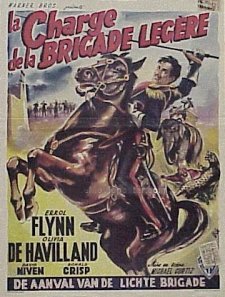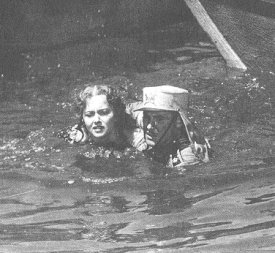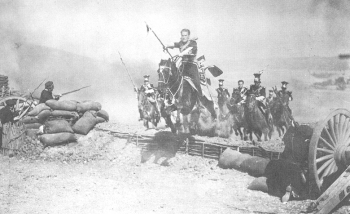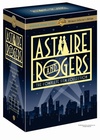


Errol Flynn & Olivia de Havilland
Filmography | Articles | Awards | Downloads | Bibliography | Links | Image Credits | Errol Flynn | Olivia de Havilland
| Page 2 |
THE CHARGE OF THE LIGHT BRIGADE (1936)
The reckless lancers sweep on and on - so that a woman's heart might not be broken! You're not fighting a single legion - you're fighting the entire British army, Surat Khan!
|
Flynn and de Havilland quickly rode the success of CAPTAIN BLOOD into another big-budget Warners adventure film the following summer. Based on the famous poem by Alfred, Lord Tennyson (poet laureate to England's Queen Victoria) about one of the bloodiest battles of the Crimean War (1853-1856), THE CHARGE OF THE LIGHT BRIGADE (1936) was the first of four Flynn-de Havilland pairings to be inspired by actual historical characters and events. Lest an unsuspecting viewer think he is witnessing a historical reenactment however, the film explicitly disavows any comparison to fact with the following prologue: This production has its basis in history. The historical basis, however, has been fictionized for the purposes of this picture and the names of many characters, many characters themselves, the story, incidents and institutions are fictitious. So fictitious, in fact, that some ninety-percent of this two-hour escapade takes place in India, not the Crimea. Further, rather than portray it as a costly military blunder, the movie credits the famous charge with precipitating the fall of Sebastopol, a Russian fortress on the north shore of the Black Sea, which was not taken by the forces of Great Britain and France until almost a year later. Warner Bros. apparently subscribed to the philosophy that the truth should never get in the way of a good story however, and divorced from its historical inaccuracies, THE CHARGE OF THE LIGHT BRIGADE is an important entry in the series of adventure films about the 19th-century British Empire that were popular in the 1930s -- THE LOST PATROL (1934), LIVES OF A BENGAL LANCER (1935), THE LAST OUTPOST (1935), ANOTHER DAWN (1937), GUNGA DIN (1939), and THE SUN NEVER SETS (1939) to name a few. On the Indian frontier, Captain Geoffrey Vickers (Flynn) of the 27th Lancers saves the life of the amir of Suristan, Surat Khan, during a leopard hunt. Surat Khan is displeased that the British government has discontinued the annuity that previously cemented their amiable alliance, but Flynn's actions earn him the amir's favor and temporarily postpone any armed conflict in the border region. |
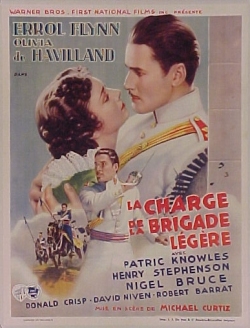 Vickers and his friends Randall (David Niven), Barclay (Walter Holbrook) and Pearson (Charles Sedgwick) return to the army's general headquarters at Calcutta where after a year's absence, Geoffrey is reunited with his fiancée, Elsa (de Havilland), and his brother, Perry (Patric Knowles), a captain with the diplomatic corps. Unfortunately, the elder Vickers is unaware that in his absence, his brother and his fiancée have developed an attachment. When her father, Colonel Campbell (Donald Crisp) discovers the relationship, he forbids Perry ever to see his daughter again and advises her to fight the passing infatuation. Campbell further resolves to take Elsa with him to his new assignment at Chukoti, an outpost on the border with Suristan, thereby removing her from Perry's presence. Geoffrey is assigned to lead a horse-buying expedition to Tartar which promises to keep him away for a few months. Before he leaves however, he is confronted by Perry who declares both his love for Elsa and her love for him. Geoffrey doesn't believe Elsa's part in the relationship and rebuffs his brother. Stopping off to say goodbye, Geoffrey promises Elsa they will be married as soon as he returns. The men head off to perform their duty and Elsa is left to contemplate the unhappy triangular romance in which she find herself. Geoffrey and his men survive a skirmish against a much larger force on the horse-buying expedition, thanks to some clever deception, and having successfully completed their mission, they are promoted in rank and sent back to the frontier to join the lancers at Chukoti. The intervening months have not resolved the conflict between Geoffrey and Perry over Elsa however, and when Geoffrey arrives at Chukoti, he discovers Elsa has made a daytrip to Lohara, a neighboring outpost under the command of Sir Benjamin Warrenton (Nigel Bruce) where Perry has recently been stationed. In their clandestine meeting under the knowing eye of Lady Warrenton (Spring Byington), Elsa and Perry reaffirm their feelings for each other, and Elsa resolves to break off her engagement with Geoffrey. |
Shortly after Elsa's return to Chukoti however, Warrenton orders the majority of the garrison to Lohara for maneuvers, unaware of a pending Suristani attack. Geoffrey protests against leaving the fort so inadequately guarded, but Col. Campbell insists on following the orders. As Geoffrey feared, Surat Khan attacks the fort, brutally slaughtering everyone, including Col. Campbell and all the women and children. Only Geoffrey and Elsa escape (right) -- a gesture to the fact that Geoffrey once saved Surat Khan's life. Before the 27th Lancers are able to regroup and avenge the massacre at Chukoti, England joins the Crimean War. Geoffrey and Perry are sent north to fight the Russians, leaving Elsa behind to mourn both her father and the uncertain fate of her two loves. Geoffrey is bitterly disappointed in the assignment until he learns that Surat Khan, having allied himself with Russia after his reprehensible actions on the Indian frontier, is now a guest of the Russian artillery force stationed on the heights above a valley near Balaklava, the new post of the 27th Lancers. Eager for revenge, when Sir Charles Macefield (Henry Stephenson), commander of the British forces in the Crimea, sends Geoffrey to Balaklava with orders commanding the Light Brigade to withdraw, Geoffrey forges new orders commanding Sir Benjamin to attack the Russian position on the Balaklava Heights. Rallied by Geoffrey with a rousing speech urging them to "Show no mercy!," the 600 men of the Light Brigade charge into heavy volleys of Russian cannon fire to find Surat Khan and avenge the Chukoti massacre. Historical inaccuracies aside, THE CHARGE OF THE LIGHT BRIGADE is quite a spectacle. Warner Bros. spent some $1,200,000 on the production and employed hundreds of horses and riders for the film's largest battle sequences.(*4) The famous charge is especially realistic and brutal, with dozens of artillery shells sending horses and riders crashing violently into the dusty plain. In fact, second unit director B. Reeves Eason's prolific use of trip wires to make the horses fall injured or killed many of them. In his autobiography, Flynn calls THE CHARGE OF THE LIGHT BRIGADE "the toughest picture I ever made" (*5) and asserts he himself complained to the Society for the Prevention of Cruelty to Animals:
|
The film's brutality is not just reserved for animals however. Though there is no evidence anyone was hurt filming the Chukoti massacre, the scenes of women and children being helplessly slaughtered, and other scenes of the Lancers discovering their slain families, though not gory, are nevertheless, quite horrible. Which leads to the film's biggest weakness when compared with other Flynn-de Havilland adventure films -- its too-often somber tone. The three principal characters spend most of the movie in a state of subdued melancholy brought on by their mutual affection; no matter whom Elsa chooses, neither she nor the brothers want the loser to be hurt. On the military front, Geoffrey is handicapped throughout the film with commanding officers who make costly errors in judgment, leaving him frequently frustrated. When combined with the massacre and the battles, only Spring Byington's romantic meddling and hen-pecking of Nigel Bruce are left to bring any real humor to the film, and she only appears in two scenes. Released in late October 1936, THE CHARGE OF THE LIGHT BRIGADE was another huge box-office hit for Warner Bros. Once again, director Michael Curtiz's ability to create exciting, dramatic action sequences deserves a great deal of credit for the film's success, as does composer Max Steiner rousing, Oscar-nominated score. Stripped of its action, exotic locales and foreign names however, THE CHARGE OF THE LIGHT BRIGADE is actually a very simply story -- a love triangle and an unrequited desire to avenge a massacre, both resolved with a suicidal charge. And with the simple story comes the problem of simple characters. |
Without an opportunity to trade impudent barbs with anyone, often times Flynn seems disappointingly stiff. And with only her romantic dilemma to keep her occupied, de Havilland's character is just not very interesting. Though both performers are given emotional scenes that they handle well, Geoffrey and Elsa do not bring out the best of what Flynn and de Havilland have to offer. Luckily for audiences, the characters they played in their next film would. More Memorable Quotations:
Footnotes: |
Go to the next page. |
| Current Contest Prize: |
|---|
| Now in Print! |
|---|
| Now on DVD! |
|---|
Buy Videos & DVDs |
|
Buy Movie Posters |
|
Buy Movie Posters |
|
Classic
Movie Merchandise |
|
![]() Printer-friendly version.
Printer-friendly version.
![]() Return
to the top.
Return
to the top.
Last updated:
December 16, 2008.
Reel Classics is a registered trademark of Reel Classics, L.L.C.
© 1997-2009 Reel Classics, L.L.C. All rights reserved. No
copyright is claimed on non-original or licensed material.
Terms of
Use.




